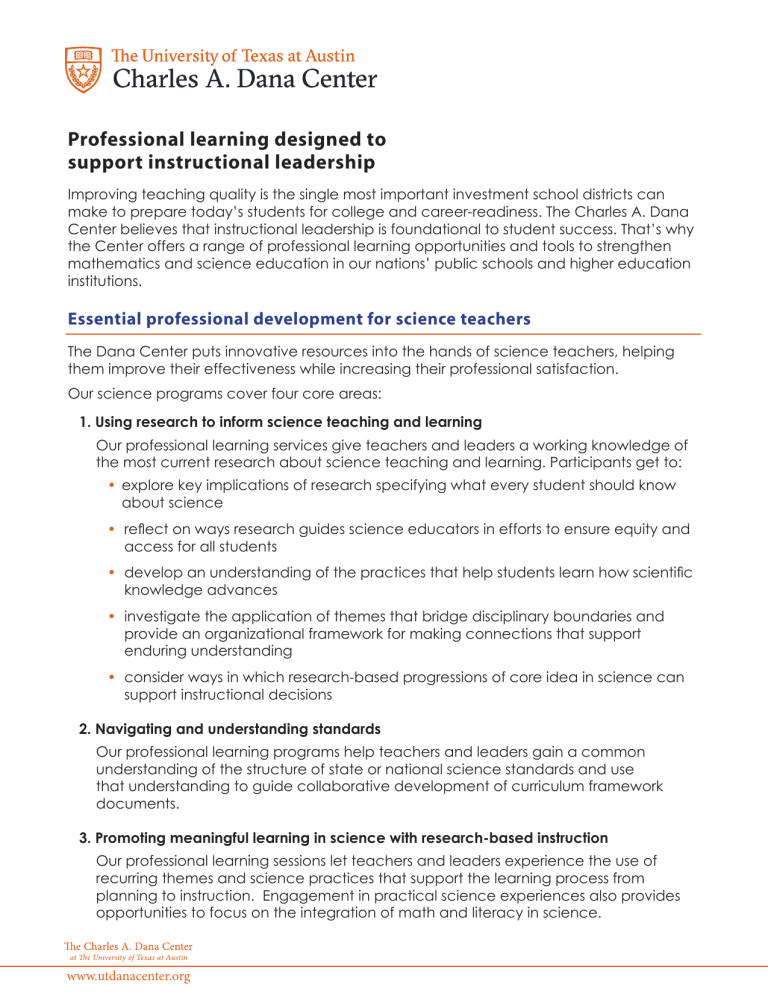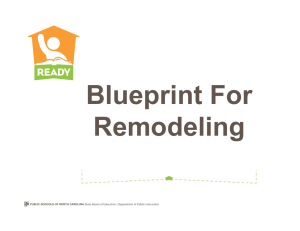Professional learning designed to support instructional leadership

Professional learning designed to support instructional leadership
Improving teaching quality is the single most important investment school districts can make to prepare today’s students for college and career-readiness. The Charles A. Dana
Center believes that instructional leadership is foundational to student success. That’s why the Center offers a range of professional learning opportunities and tools to strengthen mathematics and science education in our nations’ public schools and higher education institutions.
Essential professional development for science teachers
The Dana Center puts innovative resources into the hands of science teachers, helping them improve their effectiveness while increasing their professional satisfaction.
Our science programs cover four core areas:
1. Using research to inform science teaching and learning
Our professional learning services give teachers and leaders a working knowledge of the most current research about science teaching and learning. Participants get to:
• explore key implications of research specifying what every student should know
about science
• reflect on ways research guides science educators in efforts to ensure equity and
access for all students
• develop an understanding of the practices that help students learn how scientific
knowledge advances
• investigate the application of themes that bridge disciplinary boundaries and
provide an organizational framework for making connections that support
enduring understanding
• consider ways in which research-based progressions of core idea in science can
support instructional decisions
2. Navigating and understanding standards
Our professional learning programs help teachers and leaders gain a common understanding of the structure of state or national science standards and use that understanding to guide collaborative development of curriculum framework documents.
3. Promoting meaningful learning in science with research-based instruction
Our professional learning sessions let teachers and leaders experience the use of recurring themes and science practices that support the learning process from planning to instruction. Engagement in practical science experiences also provides opportunities to focus on the integration of math and literacy in science.
www.utdanacenter.org
Professional learning designed to support instructional leadership, page 2
4. Using formative assessment to differentiate instruction
Our professional learning opportunities help teachers and leaders make sense of key findings from research about formative assessment in order to understand its role in effective science teaching and learning. Participants use structured tools to build learning progressions and identify places within a unit of study where formative assessment is appropriate.
Join the teachers and leaders from hundreds of school districts who have reaped the bene fi ts from our professional learning programs. For more information on one and two-day programs or customized sessions, contact Brian Newsom: bnewsom@austin.utexas.edu or 512-232-5984 .
Transform Your Instructional Practice
Resources for Science Educators
The following professional learning sessions for science educators are available. Additional services and supports can be developed to meet district-specific needs.
Using Science Notebooks to Develop Students’ Literacy Skills —Science notebooks can play an important role in fostering young students’ natural curiosity. Notebooks can enhance how students process their understanding of science concepts while developing competence in writing. Regular use of notebooks gives students a chance to experiment with language, the opportunity to communicate in multiple ways, and a venue through which to share the excitement of science. With proper scaffolding and modeling, elementary students can learn to do so much more than just record observations. Participants will examine the purposes for writing in science, and explore strategies that can help guide young students as they learn to communicate their thinking. (K–2, 3–5)
Using Recurring Themes to Improve Science Teaching and Learning —Participants identify where the recurring themes are evident in the standards, investigate the themes’ role in science teaching and learning, and consider how integrating these themes into science teaching and learning leads to deeper understanding and application of science content. (K–5)
Fostering Scientific Argumentation in the Elementary Classroom —Teaching elementary students to construct explanations and engage in argumentation in science can seem daunting, but young students can learn to participate in meaningful discourse when they have the instructional support they need. Participants explore instructional strategies that provide support for students as they learn to engage in scientific argumentation and use claims, evidence, and reasoning to construct explanations of the world around them. (K–5)
Using Formative Assessment to Guide Instruction —Participants explore the role of formative assessment as they learn to collect and analyze evidence of student understanding at key points in an instructional cycle and make instructional adjustments to advance learning goals. (K–5, MS, HS) www.utdanacenter.org
Professional learning designed to support instructional leadership, page 3
Scientific Argumentation —Literacy skills are critical to the development, understanding and communication of scientific knowledge. This program strengthens educators’ ability to use reading, writing, speaking and listening strategies to build students’ knowledge and skills in science. (MS, HS)
Teaching Science for Deeper Understanding —This session is designed for adult learners.
Participants deepen their understanding of physical science concepts through collaborative engagement in a series of inquiry-based investigations. These sessions can be scheduled to target matter, energy, force and motion, or genetics. (MS)
Teaching and Learning in Middle School Science —These sessions focus on standardsbased planning, instruction and assessment. Participants engage in hands-on investigations and examine formative assessment activities that can be used to evaluate student understanding in physical, earth and space, or life science. (MS)
Systems Thinking in High School Science —Participants examine the application of the research-based recurring themes that provide students with an organizational framework to promote deep understanding of content. A series of inquiry-based activities will be used to highlight the use of recurring themes in biological or chemical systems.
Formative Assessment Activities for the Texas Standards —Participants learn effective strategies for preparing students for the biology end-of-course exam under the STAAR system or assessing student understanding of the chemistry TEKS. (HS)
For more information on our professional learning programs, contact: Brian Newsom: bnewsom@austin.utexas.edu or 512-232-5984.
Science Products
The Dana Center offers the following resources:
Formative Assessment for Middle School Science: provides hands-on, interactive activities that reinforce students’ understanding of–and ability to apply–key science concepts described in state and national standards. Available for physical, earth and space, and life science.
Formative Assessment Activities for High School Chemistry: provides hands-on, interactive activities designed to assess and reinforce students’ knowledge of chemistry content and scientific practice skills in five categories: matter and the periodic table, atomic structure and nuclear chemistry, bonding and chemical reactions, gases and thermochemistry, and solutions and chemical reactions.
Formative Assessment Activities for High School Biology: provides hands-on activities designed to reinforce students’ knowledge of the biology concepts assessed on the
STARR Biology end-of-course exam.
Assessments come in blackline masters, teacher pages, student pages, entire book with
DVD or DVD only. To learn more and order, visit: www.utdanacenter.org/products www.utdanacenter.org


